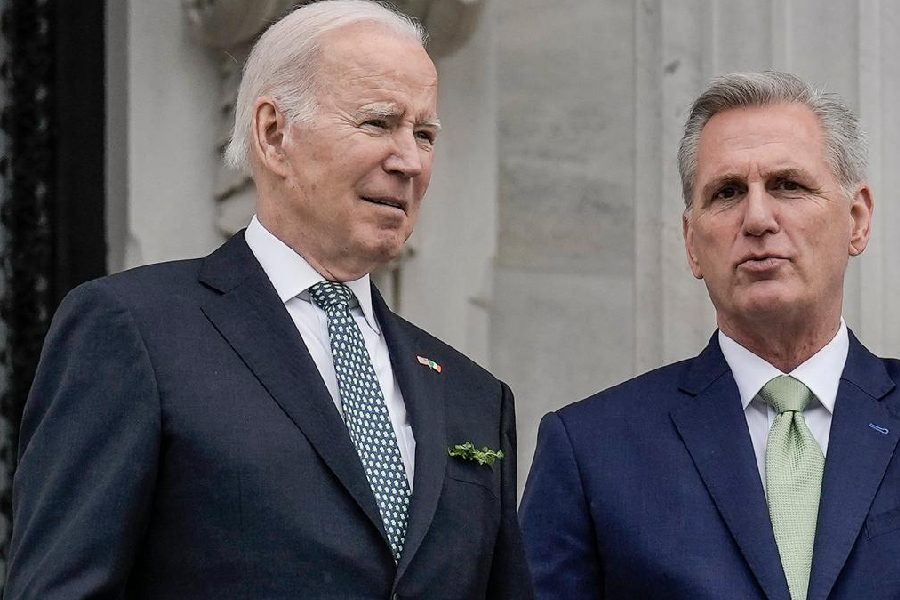US Democratic President Joe Biden and Republican House Speaker Kevin McCarthy reached a tentative deal to raise the nation's debt ceiling, McCarthy said in a statement. A negotiating team is now working on finalizing the text of the deal.
McCarthy: We made a deal 'in principle' with the White House
"I just got off the phone with the president a bit ago. After he wasted time and refused to negotiate for months, we've come to an agreement in principle that is worthy of the American people," he wrote in a post on Twitter.
Speaking to the media minutes later, McCarthy said the bill has "historic reductions in spending, consequential reforms, will lift people out of poverty into the workforce and reign in government overreach." His words indicate that Democrats have likely given into some Republican demands in order to reach an agreement.
"The are no new taxes, no new government programs, there's a lot more within the bill," McCarthy said, without giving more details as he was yet to brief other members of the House. He expects Congress to vote on the bill on Wednesday.
President Biden also took to Twitter to confirm the tentative deal. "It is an important step forward that reduces spending while protecting critical programs for working people and growing the economy for everyone," he said.
He said that the agreement represents a compromise which means "not everyone gets what they want." However, the agreement protects Democrats' key priorities.
"That’s the responsibility of governing. And, this agreement is good news for the American people, because it prevents what could have been a catastrophic default and would have led to an economic recession, retirement accounts devastated, and millions of jobs lost," Biden said. He went on to urge both chambers of the US Congress to pass the agreement.
The two leaders came to an agreement on Saturday evening, having spoken over the phone earlier that day, a person familiar with the matter told AP news agency.
This comes after a long standoff as both Democrats and Republicans played hardball in the final race for a deal ahead of a critical June 5 deadline. Reaching a deal was imperative for the US to avoid a downgraded credit rating, likely recession and potentially millions of job losses.
US Republicans have been vying for a two-year budget deal that would hold spending flat for 2024 and impose limits for 2025 in exchange for raising the debt limit for two years, pushing the volatile political issue past the next presidential election.
Democrats, on the other hand, were adamant that the ceiling should be raised without any strings attached.
What is the US debt ceiling?
The UD Congress first introduced the debt ceiling — the upper limit of money that the government could borrow — in 1917. The measure meant the government no longer needed approval from lawmakers over every debt issued. The Public Debt Acts were subsequently passed in 1939 and 1941.
Over the past seven decades, the debt ceiling has been raised a whopping 78 times, including in 2011 when the delay in agreeing to a new limit resulted in the US losing its coveted AAA credit rating, sparking an increase in borrowing costs.
While the US government has not defaulted on its payments yet, crossing the deadline without raising the debt ceiling would mean that it has run out of money to make basic payments, including salaries of tens of millions of public sector workers, such as teachers.
Social Security payments and healthcare subsidies to older and vulnerable Americans, including military veterans, would also be put on hold.
Reactions to a compromise
Even with a tentative agreement, the work to raise the debt ceiling is far from done. The news of a compromise will test whether enough moderate members support the details in the bill to overcome opposition from both hard-right Republicans and progressive Democrats.
There are multiple opportunities in each chamber along the way to slow down the process.
"I am hearing the 'deal' is for a $4 trillion increase in the debt limit," said Republican representative Bob Good. "If that is true, I don’t need to hear anything else. No one claiming to be a conservative could justify a YES vote," he said.
Democratic representative Judy Chu said that while it was important to finalize a deal, she is looking out for the details. "I will be looking to see whether there are these increased work requirements for the poor. I thought that was the worst aspect of their (Republican) proposals because that would only serve to inflict pain on the poor."
Democratic representative Ted Liu was also awaiting details of the agreement to further communicate them to the Democratic members of the caucus. "This was a House Republican manufactured crisis. It's up to House Republicans to defuse that crisis," he said about the agreement.
Meanwhile the agreement is likely to clawback $400 million from The Centers for Disease Control and Prevention's "Global Health Fund" which sends money overseas, according to Republican representative Marjorie Taylor Greene. Several countries including China, Afghanistan, Armenia, Bangladesh, Ethiopia, India, Kenya, Nigeria, Pakistan and Ukraine will no longer get access to US taxpayer money.
"Also on the chopping block is nearly $1.5 BILLION from the CDC’s "Vaccine Distribution and Monitoring Program," she said in a tweet.











